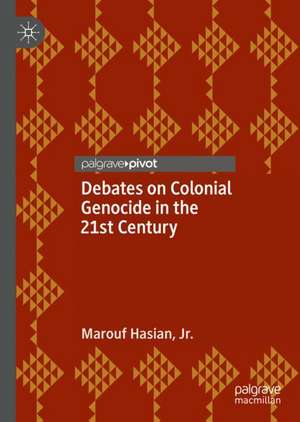Debates on Colonial Genocide in the 21st Century
Autor Marouf Hasian Jr.en Limba Engleză Hardback – 3 iul 2019
Preț: 385.08 lei
Nou
Puncte Express: 578
Preț estimativ în valută:
73.69€ • 76.50$ • 61.45£
73.69€ • 76.50$ • 61.45£
Carte tipărită la comandă
Livrare economică 22 martie-05 aprilie
Preluare comenzi: 021 569.72.76
Specificații
ISBN-13: 9783030212773
ISBN-10: 3030212777
Pagini: 153
Ilustrații: VII, 152 p.
Dimensiuni: 148 x 210 mm
Greutate: 0.35 kg
Ediția:1st ed. 2020
Editura: Springer International Publishing
Colecția Palgrave Pivot
Locul publicării:Cham, Switzerland
ISBN-10: 3030212777
Pagini: 153
Ilustrații: VII, 152 p.
Dimensiuni: 148 x 210 mm
Greutate: 0.35 kg
Ediția:1st ed. 2020
Editura: Springer International Publishing
Colecția Palgrave Pivot
Locul publicării:Cham, Switzerland
Cuprins
1. Chapter 1/Introduction: Critical Genocide Studies and the Need for 21st Century Decolonization Debates.- 2. Chapter 2: Remembering and Forgetting the Tasmanian Genocide.- 3. Chapter 3: The Indigeneity Wars: Academic and Public Refusals to Recognize Al-Nakba.- 4. Chapter 4: Opening Up the “Pandora’s Box” That Comes with Academic, Legal, and Public Acknowledgments of “Colonial Genocides”.
Notă biografică
Marouf Hasian, Jr. is Professor of Communication at the University of Utah, USA.
Textul de pe ultima copertă
This book analyses the debates on colonial genocide in the 21st century and introduces cases where states are reluctant to acknowledge genocides. The author departs from traditional studies of the work of Raphael Lemkin or U.N. definitions of genocide so that readers can examine genocide recognition as a political act that is bound up in partial perceptions and political motivations. The study looks at the Tasmanian genocide, Al-Nakba, and several other tragic events. It also looks at the ways that these historical and contemporary debates about colonial genocides are related to today’s conversations about apologies and other restorative justice acts. This work will be of interest to a wide range of audiences including researchers, scholars, graduate students, and policy makers in the fields of political history, genocide studies, and political science.
Marouf Hasian, Jr. is Professor of Communication at the University of Utah, USA.
Marouf Hasian, Jr. is Professor of Communication at the University of Utah, USA.
Caracteristici
Provides a detailed critical analysis of some of academic and journalistic debates on colonial genocide Analyzes two major cases studies of genocide, the Tasmanian genocide and the Nakba Presents the argument that all decision-makers and global denizens need to treat genocidal recognition as a rhetorical achievement
